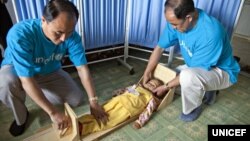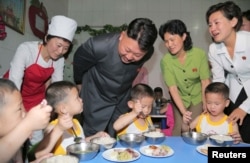Humanitarian groups are continuing to face complications, including funding shortfalls, when delivering aid to North Korea as the U.S. maintains its “maximum pressure” sanctions campaign on the country.
The United Nations granted sanctions exemption to five humanitarian organizations earlier this month, raising the total number of groups that can deliver aid to North Korea to 21.
Humanitarian agencies said sanctions placed on North Korea have created complications for aid groups that need to secure funds and deliver assistance to the country.
In order to deliver assistance in North Korea, U.S. charities need to secure approvals from the U.S. Commerce Department, the Treasury Department, and the U.N. Security Council sanctions committee, and American relief workers are required to obtain special travel passports from the State Department to travel to North Korea, according Foreign Policy.
Daniel Jasper, public education and advocacy coordinator for Asia at the American Friends Service Committee (AFSC), said the State Department held a roundtable session with U.S. and international nongovernmental organizations (NGOs) in January to discuss sanctions regulations and travel restrictions.
“In the absence of a comprehensive agreement between the U.S. and North Korea, we are hoping the U.S. will tweak existing regulations to help improve conditions for humanitarian operation,” Jasper told VOA.
He said steps that sanctions regulators could take to help improve humanitarian operations include “issuing a ‘white list’ of acceptable goods to expedite approval process, issuing a more comprehensive general license that permits ongoing and well-established humanitarian programs to carry on without the need for additional approvals, and working with banks to create a ‘white channel’ to help expedite program funding.”
In the meantime, Christian Friends of Korea, a U.S. aid group approved with an exemption this month, left for North Korea on Saturday for a three-week humanitarian mission, according to Heidi Linton, the organization’s executive director who spoke with VOA's Korean Service last week before the group departed. The North Carolina-based group works with “TB, hepatitis and pediatric care centers … and engages on projects such as solar-gravity water system installations, renovations of care centers, and hepatitis treatment clinics," according to its website.
US: No sanctions relief
The U.S. refused to lift sanctions on North Korea in February when the country’s leader, Kim Jong Un, asked President Donald Trump to remove them during talks at the Hanoi summit. The U.N. and U.S. have placed rounds of sanctions on North Korea since 2016, following its nuclear and ballistic missile tests.
Trump said on Friday in a tweet that he is against imposing “additional large-scale sanctions” on North Korea.
Pierre Peron, spokesperson for the U.N. Office for the Coordination of Humanitarian Affairs (OCHA) in the Bangkok regional office, said, “While Security Council sanctions imposed on the country clearly exempt humanitarian activities, humanitarian agencies continue to face serious unintended consequence on their programs, such as lack of funding, the absence of a banking channel for humanitarian transfers and challenges to the delivery of humanitarian supplies.”
According to Peron, sanctions make donors more cautious about funding operational costs. He said suppliers of humanitarian goods take a “risk-averse approach” because of the complicated regulatory requirements, delays in port clearance, higher expenses and “reputational risks” associated with delivering humanitarian aid to North Korea.
North Korea is “one of the lowest-funded [countries] in the world,” according to 2019 DPR Korea Needs and Priorities Plan, a report issued earlier this month by the United Nations.
With an estimated 11 million men, women and children lacking sufficient nutritious food, clean drinking water, or access to basic health and sanitation services, Peron said in 2018 North Korea received less than half of the $111 million that international humanitarian agencies deemed necessary.
This year, the U.N. is appealing for $120 million to cover aid for the most vulnerable 3.8 million North Koreans.
“The low level of funding is impacting operations,” said Peron. “Agencies have been forced to scale back essential programing… seriously compromising the delivery of basic humanitarian interventions that are crucial to safeguard the lives of the most vulnerable.”
Children at risk
Roy Wadia, spokesperson for the United Nations Population Fund (UNFPA) at the Asia and Pacific Regional Office in Bangkok, said 1.4 million people in North Korea, including 190,000 kindergarten children and 85,000 acutely malnourished children, did not receive food assistance last year due to the shortage of funds.
“If humanitarian programs were to be forced to further scale back or draw down completely, the impact would be devastating on the lives of millions of vulnerable people, jeopardizing the access and results gained overtime,” said Wadia.
The UNFPA is one of five humanitarian organizations granted an exemption by the U.N. in March. It focuses on providing reproductive health services to pregnant women through an office it has had in North Korea since 1985.
Shima Islam, spokesperson for the U.N. International Children’s Fund (UNICEF) in East Asia and Pacific Regional Office in Bangkok, said, “The U.N. sanctions against [North Korea] explicitly recognized that special steps must be taken to ensure that sanctions don’t add to the suffering of children.”
UNICEF, which has been working in the country since 1985, was granted a sanctions exemption by the U.N. in November and has staff in Pyongyang.
Kevin Martin, the president of Peace Action, said sanctions hurt the people of North Korea and “the exemptions should be fairly generous based on the needs of the people in North Korea.”
Peace Action and a number of NGOs sent a letter to Trump in October, asking him to urge the State Department and Treasury Department to modify the U.S. sanctions regulations “to allow timely delivery of humanitarian aid and other NGO engagement” in North Korea, according to the letter obtained by VOA Korean Service.
Jasper, of the AFSC, said he was encouraged by a State Department statement made at the roundtable which said, “The State Department is committed to clearing a backlog of sanctions waiver applications and applications for travel to North Korea.”
AFSC, which was among the signatories to the letter sent to Trump, has helped North Koreans increase agricultural yields with assistance on implementing sustainable agricultural practices on the cooperative farms.
Ahn So-young of VOA’s Korean Service contributed to this report.





